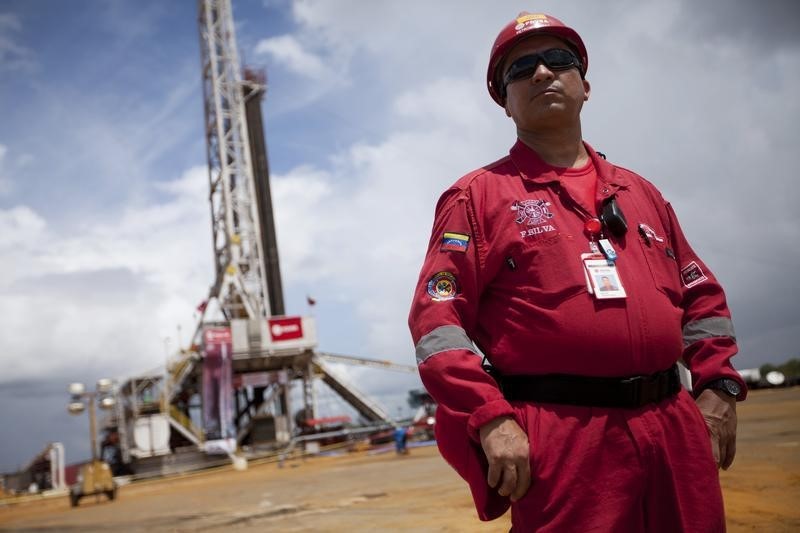By Marianna Parraga
HOUSTON - Venezuela's cash-strapped state oil giant PDVSA will end up paying at least $130 million more than it planned for crude imports after payment delays to major BP (LON:BP) Plc, according to internal documents analyzed by Reuters.
Years of underinvestment and mismanagement have impaired oil production in Venezuela, set to fall to a 14-year low in 2016, even though the country holds some of the world's largest crude reserves. As a result, PDVSA has been forced to increasingly rely on imports to dilute its own extra-heavy crude barrels.
That is why in March it made its first crude purchase from U.K.-based BP after awarding it a very large tender for which it expected to spend $230.9 million, or some $31 a barrel, in prepaid shipments of 7.4 million barrels, during the second quarter.
But payments have been delayed for weeks and even months, keeping BP from discharging tankers on time. That boosted the price tag for the oil as BP was able to reprice some cargoes, and also charge PDVSA for keeping vessels offshore.
It is the latest black eye for PDVSA, which is locked in a negative spiral where its declining exports and weakened balance sheet cause payments to suppliers to accumulate.
Pending invoices to providers have piled up as the company races against the clock to refinance foreign bonds maturing in 2016 and 2017 to avoid a $3 billion payment due in the last quarter of this year.
At the end of 2015, Venezuela's PDVSA had $43.8 billion in consolidated financial debt.
The cash crunch has hurt its ability to import diluents needed to formulate exportable crude grades and refined products to supply Venezuela's domestic market. It has resorted to oil swaps to access imports.
The total price tag for the BP tender rose 57 percent due to the delays to an average of $49 a barrel through August from the $31.21 planned in March, invoices and internal documents show.
Under a purchase tender, two parties or more agree on a contract to supply specific crude types and volumes in a timeframe set by the importer.
Because Venezuela needed the barrels, as the tankers piled up, PDVSA and BP agreed on new discharge windows. That allowed BP to take advantage of the rebound in crude prices and reprice the oil.
As of mid August, PDVSA's estimated total cost for the cargoes rose to $383 million, according to the documents. That also includes the cost of an additional 420,000 barrels requested later.
Demurrage, or the cost of keeping a vessel at sea, is expected to add even more fees. Some 2.7 million barrels are currently stuck at sea around PDVSA's terminal in Curacao for lack of pre-payment.
PDVSA did not respond to requests for comments. BP declined to discuss commercial operations.
The delays started with the very first cargo, which arrived in Curacao in April as planned, but paid by PDVSA two weeks later. Since then, waiting times for BP to receive the money transfers and authorize discharge have reached up to 70 days.
In one internal communique, PDVSA acknowledged its cashflow woes were causing logistics problems.
"Due to financial limitations, we have been unable to discharge the three last cargoes scheduled for April," said a member of PDVSA's trading team, in an internal letter from May seen by Reuters.
The contract also said PDVSA would reimburse BP for any and all costs as a result of a suspension or termination of the contract in case of failed payment, including "storage, demurrage, resale and losses."
Since then, BP has claimed $770,000 in demurrage for the first two cargoes delivered and could do the same for 11 other cargoes that have faced delays.
LEANING ON CITGO
To help with the import costs, PDVSA turned to its unit in the United States, Citgo Petroleum, to pay two invoices to BP for a total of $43.7 million, according to bank transfer vouchers seen by Reuters.
Citgo declined to comment.
Even after the subsidiary intervened, the parent company said in an internal document on August 18 that it had a budget shortfall of $152 million.
Many other communiques confirmed that PDVSA would be subject to prices higher than it originally anticipated due to delays.
So far, nine cargoes carrying 4.77 million barrels have discharged at Bullenbay terminal in Curacao after being nearly entirely paid for, excluding demurrage costs. Out of 13 ordered cargoes in total, 4 are stuck at sea by payment delays.
Though many risk-averse suppliers have shied away from PDVSA, BP structured a deal that - even with oil stuck at sea - allowed it to capture a recovery in prices.
From early April through August, U.S. crude prices increased by 22 percent to $44.70 per barrel.
The complex deal between the Venezuelan and British companies is far from over, according to a source from PDVSA's commercial operations, as demurrage claims submitted to the Venezuelan state-run firm can take years to be resolved.
